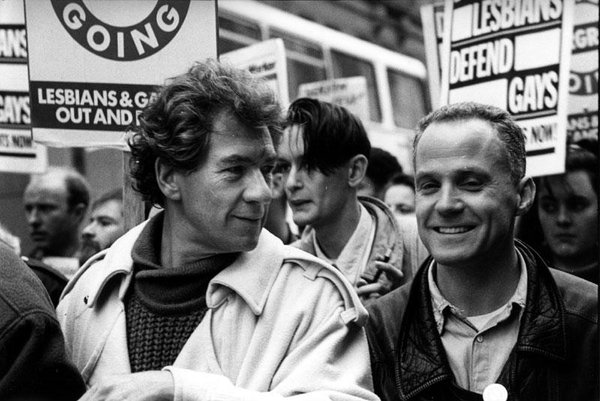Michael Cashman was raped so often he thought it was just something that happened to gay men

Michael Cashman and Ian McKellen on an early gay rights march
Stonewall co-founder Michael Cashman candidly revealed that he was raped so regularly growing up that he thought it was just “what happened to gay men”.
Speaking to The Guardian, the peer opened up about how his childhood in East London and performing in plays was mired by trauma.
Cashman, 69, now years removed from his past, described how, aged 12 performing in Oliver!, he was approached by a cast-member who assaulted him.
“I wanted my mother to rescue me,” Cashman said, but this was just one incident in a long line of abuse that the former Eastenders star faced.
Michael Cashman was sexually abused aged eight.
Cashman was cast as one of Fagin’s gang members and as the understudy of Oliver in the West End play.
During his stint, he was introduced to the show’s director and manager, who was in his late 20s.
He convinced Cashman’s parents to let him stay overnight with his “wife and children” the night before the show. But Cashman arrived only to find neither family members in sight.
Instead, the manager greeted Cashman alone at a boarding house, requesting a twin room for him and his “son”.
That night, the man climbed into Cashman’s bed and assaulted him.
“But when you are being abused, it’s first of all [about] trying to find the words to describe how you feel, then the words that describe what’s being done to you, then the confidence that people will believe you,” he said.
“After the second time, I just found a way of switching myself off, so that I remembered the days when he would take me off to Kew Gardens, the river or the cinema.”
However, this was not an isolated incident, he said.
Assault patterned his early years. Aged eight, a young docker pinned him down and sexually assaulted Cashman.
He remained silent about the incident for years.
“I’ve had to face these demons that I’ve buried, that have played around with me,” he said.
“I didn’t feel I could be loved; I felt I couldn’t belong, I would try and [self-]sabotage.”
‘The abuse I suffered hurt me so much.’
At 14, while filming the 1965 film, I’ve Gotta Horse, an older friend of the film’s director whisked him away to a bedroom.
Whiskey was poured to the teen before he was sexually assaulted. Silence clouded his teens as the man pelted him with abuse throughout the production.
“The abuse I suffered hurt me so much,” Cashman said.
At one point I thought: ‘Have I got an invisible sign on my forehead that says: Abuse me, I won’t tell?’
“You know that if you do [tell someone] you open something that is so terrifying, over which you have no control.
“So your best way to deal with it is to bury it.”
When a man raped Michael Cashman, he thought this is just what happens to gay men.
When he was raped by a man in the 1960s, Cashman convinced himself he provoked his rapist. Going to the authorities was no option for gay men at a time when their existence was illegal.
“It was the narrative that we lived with,” he said.
“That this is what happened to gay men. They got beaten up, they got raped, they asked for it, they deserved it.
“Growing up in the knowledge that having sex with someone made you a criminal has a psychological impact.
“When someone mistreats you, your immediate reaction is: ‘Well, I must have asked for it.'”
As much as the spectre of his past has haunted him, Cashman said that writing his memoir, One of Them, gave him an opportunity to pause and reflect on the incidents he was silent on for so many years.
“Once you look back and you own all that happened to you, you’re in control.
“If you’re honest about what’s happened to you, you grow.
“If you don’t, then it will own you.”

